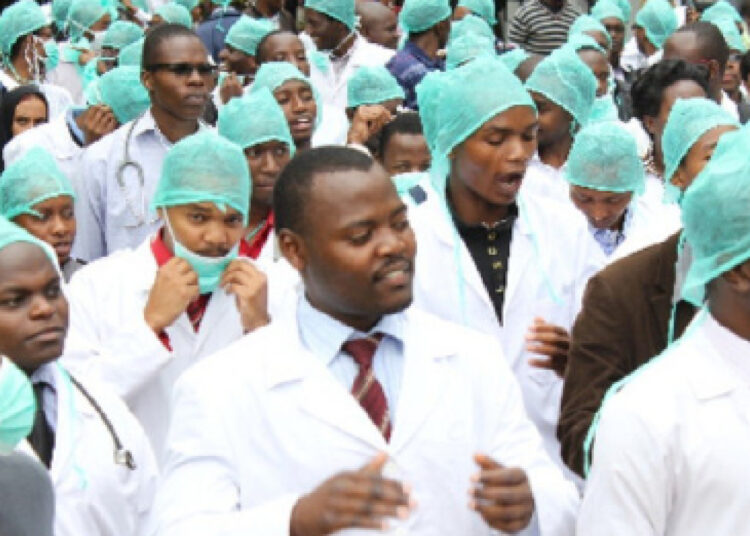A federal government directive to colleges of medicine and nursing in Nigerian universities to increase their students’ intake by 100 percent is being threatened by the dearth of facilities, capacity among others.
The directive was given on January 22, 2024 as parts of the government’s efforts to address the shortage of healthcare workers due to the mass exodus of professionals popularly known as “Japa”.
This was contained in a letter from the Medical and Dental Council of Nigeria (MDCN) and addressed to the secretary-general, Committee of Vice Chancellors of Nigerian Universities. The letter with the reference number MDCN/1018/vol.1 and dated January 22, 2024, was signed by T.A.B. Sanusi, the registrar of MDCN.
But in an interview with top officials, including provosts of some medical schools, LEADERSHIP Sunday gathered that the quest is being hindered by poor facilities such as accommodation, adequate manpower and the carrying capacities of the schools.
In fact, universities’ medical schools and schools of nursing in Kwara State have not implemented the directive.
Findings by LEADERSHIP Sunday in Ilorin, the Kwara State capital, showed that the affected institutions have not increased the number of their students’ intake.
Though it was difficult to obtain official information on their admission quota, feelers from senior management staff of some of the universities and nursing institutions indicated that certain constraints were hindering their abilities to increase the number of their students.
A senior management staff at the University of Ilorin Teaching Hospital (UITH) said, “The UITH has a school of nursing with limited facilities for a few of her students. It is so because the school is yet to be relocated to its permanent site, but in a few years’ time, the relocation will be feasible. Already, works on the construction of the sites have reached about 70 per cent.
“The doubling order is good but what should be more paramount is the directive to recruit more nurses. The doubling and recruitment should be simultaneously fashioned out for more effective service delivery,” he said
Another management staff of the university who also volunteered information on the condition of anonymity said, “I am not aware of any such federal government’s directive. I doubt its authenticity because the same government, through the Nigerian Universities Commission (NUC), has a very strict admission quota policy that restricts the number of candidates any university can admit into all courses, especially professional courses.”
In Kano State, the Provost of College of Health Science, Bayero University Kano, Prof. Aisha Kuliya, said it’s a good idea that the government had given the directive considering the shortage of manpower in the sector, both in clinical and allied sciences.
She highlighted the desire of the institution to increase the quota of MBBS and BBS as directed, but stressed that, “we lack the capacity in terms of accommodation, teaching facilities such as laboratory among others.
“The recommendations of the MBBS are like 10 students to a lecturer but the problem is that some of the subjects are being overpopulated. Some fields have more lecturers than the others in the ratio of 1:2. But the facilities are the most desirable to be expanded to meet the demand.
“Specifically for us, the last time we had accreditation, there was COVID and a strike by the Academic Staff Union of Universities (ASUU), so we have a backlog of classes; that made us to be banned from admitting until they graduate and that is why we are not admitting this year. These are the problems keeping us behind the government’s directive,” Kuliya said.
But, the Provost of the College of Medicine, University of Port Harcourt, Prof. Angela Frank-Briggs, said the institution was complying with the directive of the government on doubling the intake of students by 100 percent in order to curb the crisis in the health sector.
Speaking with our correspondents in Port Harcourt, Frank-Briggs explained that the university supports the government’s directive, adding that the College of Medicine was in the process of putting all that is needed in place.
She said, “The University of Port Harcourt is in full support of this directive from the government and we are in compliance. We are in the process of putting all that is needed in place. We don’t have many challenges. All that we need are being put in place to make it happen.”
Also, the spokesman of the university, Dr. Sam Kpenu, said the institution had increased its quota for medical students to about 150, adding that efforts were on to further increase the quota by applying to the Medical and Dental Council of Nigeria.
Kpenu said, “The fact is that we have been able to meet up our quota, our quota is about 150. Apart from that, we are also making plans to increase our quota in applying to the Medical and Dental Council of Nigeria.
“We have our equipment but like Oliver Twist, we still need more to improve it, especially for Dental students. The equipment to train dentists is very expensive. We are also planning to improve on the facilities we already have,” he said.
On the solution to Japa syndrome, the president of the Association of Resident Doctors at the UITH, Dr Mariam Shiru, stressed the need for a wholistic approach to reforms in the health sector.
Shiru said, “It has to be a wholistic approach targeting reform of the health sector and Nigeria in general. Financial stability is just one of the reasons for “japa”, many others go because of other reasons like insecurity, lack of an organised system in Nigeria and also for better opportunities for their children.”
The provost of Kwara State College of Health Technology, Offa, Dr Aliyu Alabi, stressed the need for the federal and state governments to strengthen the products of the colleges in the country to address the dearth of personnel in the health sector.
Alabi said the products of the health colleges could be used to replace the large number of medical doctors, nurses and other medical workers leaving the country in droves
A medical expert, Dr. Stephen Emeka, said there was need for reforms towards retaining health professionals within the country in order to curb the Japa syndrome.
Emeka said, “Let Nigerian government provide what they are providing for them abroad, Nigeria has the resources to provide comfort for them here, if every doctor can feed himself, pay his children’s school fees, they won’t travel out of the country.”











